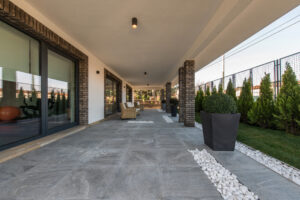
What surfaces require sealing?
If you have any outdoor stone that is susceptible to freezing and thawing, it should be sealed. You might be startled to learn that parts of California are affected by the freeze-thaw cycle, but it’s real. A home or business owner may choose to seal their floors in order to repel stains, decrease dust, resist chemicals, and keep an appealing stone floor.
What if my stone floor isn’t sealed?
If the stone you have is porous, such as marble, it will absorb liquids quickly. Consider how the liquid that goes through the stone will behave if you live in a place where the ground freezes and thaws: The surface of unsealed stone will eventually be destroyed. Other substances, such as oil, household cleansers, salt, and fertilizer, might discolor and/or damage your stone floor.
How much does stone sealing cost?
It depends on the sort of stone you’re working with and the sealant you’re using. Acrylic-resin sealers and chemically penetrating sealers are both less expensive than others. This includes, for example, silanes, siloxanes, and silicates. Then there are high-performance topical coatings, such as epoxies and urethanes, which are more expensive. Keep in mind that the quality of sealer you use will determine how long the seal lasts, so spending a little more now can save you money later.
What will it look like when it’s finished?
The answer to this question will vary depending on the type of sealer utilized. If a chemically reactive sealer is employed, it will almost completely disappear since it will enter the concrete. If a solvent-based acrylic resin sealer or epoxy is employed, however, considerable color enhancements may be achieved. Finally, urethane sealers are available in a variety of finishes, ranging from glossy to matte.
Is it possible to seal it myself?
This is not something we recommend. Are there any products on the market that claim to be suitable for everyone? There are some. You will, however, be without a guarantee if you perform it yourself. You’ll have to invest in specialist equipment that you’ll only use once. Concrete that has been incorrectly sealed might cause major health issues.
In summary, we strongly advise you to leave it to the stone care specialists. Fuller Stone Care can provide you with an estimate and other information by calling 310-944-9099.
